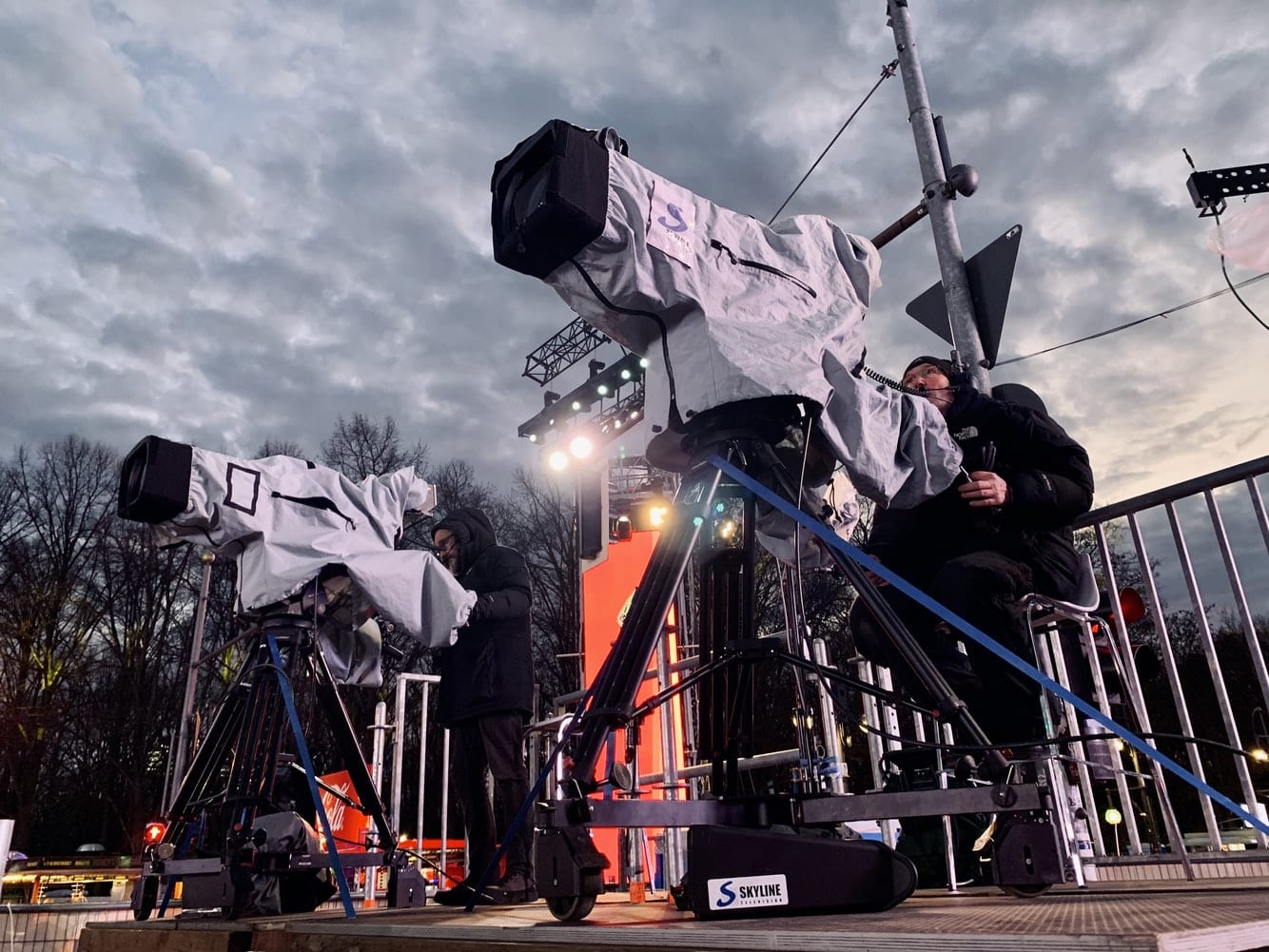Exactly How Event Production Works: A Comprehensive Take A Look At the Process
Event production is a complex and organized procedure that needs cautious planning and implementation. It starts with establishing clear purposes and recognizing the target market. Each step, from budgeting to location choice, plays an important role in making sure success. As the process unfolds, various elements have to line up perfectly. Yet, the nuances of this complex operation usually go undetected. What are the vital phases that contribute to a memorable event?

The Initial Drawing Board
When beginning on event production, mindful planning is vital to ensure an effective result. The initial drawing board offers as the structure for all subsequent efforts. During this phase, event producers must define the event's objective and objectives plainly. Recognizing the target market helps tailor the experience and messaging, assuring relevance and engagement.Producers need to additionally take into consideration the event layout, whether it be in-person, online, or crossbreed, as this will affect different logistical elements. Choosing an ideal day and location is important, as it influences accessibility and availability.Furthermore, assembling a trustworthy group is basic for dividing duties and streamlining interaction. Establishing a timeline with landmarks guarantees all tasks are completed on timetable. This stage involves thorough study, consisting of identifying potential challenges and devising methods to alleviate risks. Inevitably, a well-structured preliminary planning phase sets the tone for a successful event production trip.

Budgeting and Resource Appropriation
In event production, efficient budgeting and source allotment are critical for success - event production charlotte. Establishing economic specifications establishes the foundation for all subsequent choices, while resource circulation strategies ensure that every part of the event is sufficiently supported. Together, these components help preserve control over expenses and optimize using readily available resources
Developing Financial Parameters
Developing financial specifications is vital to the success of any type of event production, as it establishes the structure for reliable budgeting and source allotment. This procedure starts with defining the overall budget plan, which incorporates all aspects of the event, including location costs, food catering, and advertising and marketing. By determining readily available funds, event organizers can prioritize expenses and allocate resources accordingly. Furthermore, it is crucial to conduct complete marketing research to anticipate potential expenses and determine funding resources, such as sponsorships or ticket sales. Establishing clear economic criteria additionally aids in risk administration, permitting planners to set aside contingency funds for unexpected expenses. Ultimately, a well-defined budget works as a roadmap, leading the event production team towards attaining their objectives while maintaining monetary control.
Resource Circulation Techniques
Reliable resource distribution approaches are vital for making best use of the impact of an occasion while sticking to spending plan restrictions. Successful event production calls for a thorough technique to budgeting and source allocation. Planners have to focus on vital components such as venue, event catering, and modern technology, guaranteeing that funds are assigned to areas that boost attendee experience. A comprehensive budget plan needs to detail expected expenses and determine areas for potential price savings, such as discussing with suppliers or discovering sponsorship chances. Additionally, tracking expenses throughout the preparation process helps protect against overspending. By utilizing strategic source circulation, event manufacturers can provide a memorable experience while preserving monetary obligation, inevitably adding to the general success of the event.
Place Option and Logistics
Selecting the ideal venue is vital to the success of any kind of event, as it sets the phase for the overall experience. Venue selection involves examining different variables, including capability, availability, and area. Coordinators have to consider the target market and the nature of the event, making certain the location lines up with the event's goals.Logistics play a substantial function in this process, entailing setups for seats, audiovisual tools, and providing solutions. An appropriate place must facilitate smooth circulation for participants and staff, boosting engagement.Additionally, evaluating potential locations for features like parking, restrooms, and emergency departures is very important for safety and comfort. The timeline for safeguarding the venue is also vital, as prominent places might reserve swiftly - event production charlotte. Subsequently, thorough preparation and prompt execution can inevitably add to a smooth event experience, making location choice and logistics basic components of effective event production
Innovative Idea Advancement
While the venue sets the physical phase, creative concept growth forms the event's identification and narrative. This process starts with recognizing the event's objective and target audience, enabling event producers to develop an engaging style that resonates with attendees. Conceptualizing sessions usually consist of diverse perspectives, cultivating innovative ideas that line up with the event's goals.Once a style is established, visual components such as shade combinations, signage, and style are designed to boost the general atmosphere. Storytelling strategies might likewise be integrated to create an appealing trip for participants, ensuring a memorable experience. Furthermore, considerations regarding entertainment, activities, and interactive components are straightened with the selected concept, enhancing the theme throughout the event.Ultimately, reliable imaginative idea development assurances that every element of the event functions cohesively, leaving an enduring impact on participants and satisfying the event's objectives. This fundamental work lays the foundation for succeeding planning and execution phases.
Working together With Suppliers and Suppliers
Successful event production rests on efficient cooperation with vendors and vendors. Picking reputable companions, bargaining contracts successfully, and ensuring prompt deliveries are crucial actions in this procedure. Each of these factors contributes substantially to the overall success and smooth implementation of an event.
Choosing Reliable Partners
Just how can event planners guarantee a seamless production experience? Choosing trusted partners is important in achieving this goal. Event coordinators should perform thorough research to identify vendors and vendors with a tried and tested track record of excellence. This includes examining recommendations, examining profiles, and examining consumer responses. Organizers need to focus on companions that demonstrate professionalism and trust, prompt interaction, and a desire to work together. Structure strong connections fosters count on and enables fast problem-solving throughout the event. Furthermore, it Website is advantageous to select regional suppliers that understand the place and regional logistics. Ultimately, a successful event depends upon the synergy in between coordinators and their partners, guaranteeing that every aspect of production runs efficiently and successfully.
Discussing Contracts Efficiently
Effective settlement of agreements is a crucial action in the collaboration between event organizers and their suppliers and distributors. This process entails clear interaction of expectations, deliverables, and timelines. Coordinators must conduct complete research on market rates and market criteria to develop a baseline for settlements. It is essential to develop a collective environment, encouraging open discussion regarding terms, prices, and prospective backups. Planners ought to additionally focus on understanding the vendor's capabilities and restrictions to straighten their needs efficiently. Adaptability can cause mutually beneficial arrangements, promoting lasting relationships. Crafting distinct contracts that consist of particular efficiency metrics can aid guarantee liability, ultimately resulting in effective event implementation and fulfillment for all parties entailed.
Guaranteeing Prompt Shipments
Prompt deliveries are necessary for the smooth implementation of any event, needing thorough collaboration between coordinators and their vendors and vendors. Efficient interaction is essential, as it helps develop clear assumptions concerning distribution schedules, amounts, and details requirements. Coordinators usually produce in-depth timelines to describe important landmarks, guaranteeing all celebrations stay aligned throughout the process. Routine check-ins with suppliers can aid determine possible hold-ups early, enabling for positive options. Furthermore, developing strong relationships with reputable distributors cultivates trust fund and accountability, which can cause far better solution and prioritization. By focusing on these collective efforts, planners can minimize disruptions, thus improving the total performance of event production and ensuring that all needed products and solutions show up as prepared.
Advertising and Promotion Techniques
While organizing an occasion, the success of advertising and promo approaches can considerably influence presence and interaction. Effective approaches commonly include a combination of electronic advertising and marketing, traditional advertising and marketing, and grassroots outreach. Utilizing social media sites systems permits real-time communication and targeted marketing, reaching details demographics successfully. Email advertising projects can further engage prospective participants with customized web content and reminders.Collaborations with influencers or sector leaders can additionally boost integrity and widen reach. Developing appealing web content, such as videos or blogs, assists to create buzz and sustain rate of interest leading up to the event. In addition, leveraging early-bird discount rates and special rewards can incentivize ticket purchases.Promoting through standard networks, such as posters or local media, remains appropriate, specifically in community-focused occasions. A thorough technique that incorporates multiple methods guarantees optimum presence and engagement, eventually adding to the event's success and the development of a memorable experience for guests.
On-Site Implementation and Administration
On-site execution and management are necessary parts that determine the general success of an occasion. Effective sychronisation during the event ensures that all aspects line up with the prepared program. Event supervisors supervise logistics, consisting of supplier coordination, devices arrangement, and visitor solutions. Keeping track of timelines and addressing any unexpected concerns are basic for maintaining a seamless experience.The personnel plays a substantial duty, as experienced personnel are responsible for numerous jobs such as enrollment, information dissemination, and technical assistance. Interaction amongst group members is vital; it promotes a collective atmosphere and enables quick resolution of challenges.Additionally, safety protocols should be adhered to, protecting the well-being of all guests. special info Post-event evaluations are likewise part of on-site management, offering insights for future improvements. By concentrating on these aspects, event producers can produce memorable experiences that fulfill or exceed participant assumptions while accomplishing the event's goals.
Often Asked Questions
Just how Do I Choose the Right Event Motif?
Choosing the appropriate event style involves considering the target market, event function, and location. Looking into current fads and gathering input from stakeholders can likewise inspire innovative concepts that resonate and create a remarkable experience.

What Are Usual Errors in Event Production?
Typical mistakes in event production frequently include poor preparation, bad communication amongst staff member, budget mismanagement, disregarding to think about the target market's needs, and falling short to perform a complete post-event evaluation for future improvements.
How Can I Gauge Event Success?
To determine event success, one can evaluate guest satisfaction, involvement degrees, budget plan adherence, and post-event responses. Secret performance signs, such as ticket sales and social networks click for more info interactions, additionally supply valuable understandings into total efficiency.
What Should I Do if It Moistens the Event Day?
In case of rainfall on the day, the organizer should implement contingency plans, such as securing tents or relocating tasks inside your home. Communication with guests about adjustments is necessary to guarantee a smooth experience regardless of climate obstacles.
Just How Can I Ensure Participant Interaction During the Event?

Comments on “What makes event production charlotte exceptional for corporate events?”